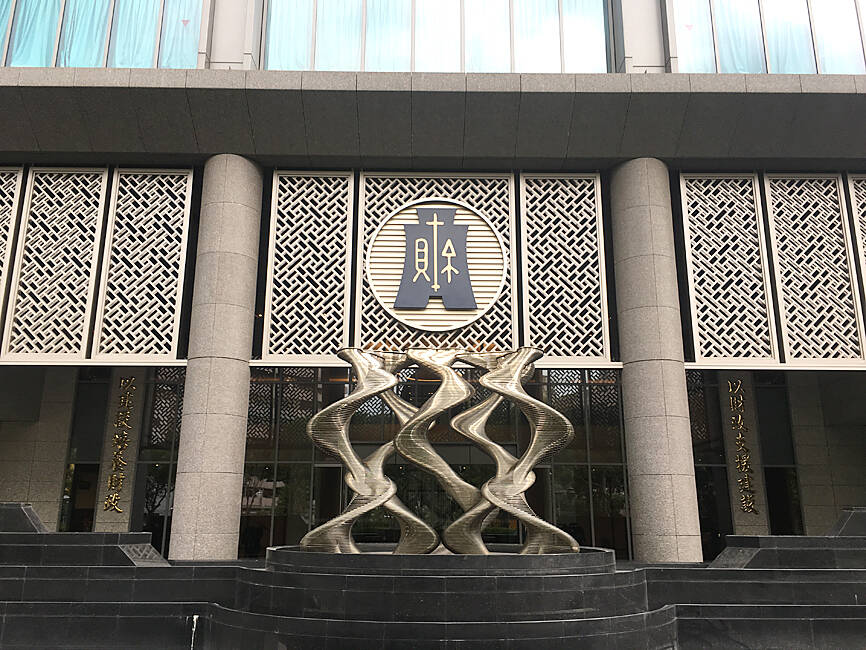Tax revenue last month totaled NT$214.7 billion (US$7.05 billion), rising 5.9 percent from the same period a year earlier on the back of record-high tariffs and inheritance taxes as demand for imported vehicles rose, the Ministry of Finance said yesterday.
The data were in line with a boom in vehicles sales, a chill in property transactions and signs of a recovery on the local bourse, ministry statistics official Liang Kuan-shuan (梁冠璇) told an online media briefing.
Tariffs and inheritance taxes, unusual revenue growth drivers, spiked 30.6 percent and 97.2 percent year-on-year to NT$14.9 billion and NT$5.2 billion respectively, Liang said, adding that it was not clear whether the uptrend would continue.

Photo: Clare Cheng, Taipei Times
Tariffs from imported vehicles totaled NT$4.1 billion, Liang said.
Vehicles packed local ports waiting for their owners, a rare sight after port congestion amid COVID-19 lockdowns ended, she said.
Car imports also helped boost the sales tax total by 20.2 percent to NT$14.7 billion, she said.
The number of new license plates issued last month more than doubled to 44,161, Chinese-language media reported earlier.
The ministry declined to supply details for the surge in inheritance taxes except to say there were three cases that generated more than NT$100 million.
Inheritance tax rates are unpredictable, it added.
By contrast, land value increment taxation totaled NT$6.9 billion, down 36 percent from a year earlier, as taxable cases decreased 22.9 percent to 49,552, consistent with a cooling property market, Liang said.
Taxes from securities transactions, a gauge of stock investment interest, shrank 19.5 percent to NT$17.6 billion, reversing a rebound in February, ministry data showed.
The February rebound in securities transactions had a lot to do with the effect of national holidays, so the data were not overly significant, Liang said.
While daily turnover continued its negative cyclical movements, the pace of retreat has tapered off, she said, adding that things might improve as evidenced by TAIEX rallies in the past few weeks.
In the first quarter, tax revenue totaled NT$487.2 billion, a 0.9 percent increase from the same period last year, the ministry said.
The total was 15.9 percent of this year’s budget, 13.5 percent ahead of the schedule, it said.

RUN IT BACK: A succesful first project working with hyperscalers to design chips encouraged MediaTek to start a second project, aiming to hit stride in 2028 MediaTek Inc (聯發科), the world’s biggest smartphone chip supplier, yesterday said it is engaging a second hyperscaler to help design artificial intelligence (AI) accelerators used in data centers following a similar project expected to generate revenue streams soon. The first AI accelerator project is to bring in US$1 billion revenue next year and several billion US dollars more in 2027, MediaTek chief executive officer Rick Tsai (蔡力行) told a virtual investor conference yesterday. The second AI accelerator project is expected to contribute to revenue beginning in 2028, Tsai said. MediaTek yesterday raised its revenue forecast for the global AI accelerator used

Taiwan Semiconductor Manufacturing Co (TSMC, 台積電) has secured three construction permits for its plan to build a state-of-the-art A14 wafer fab in Taichung, and is likely to start construction soon, the Central Taiwan Science Park Bureau said yesterday. Speaking with CNA, Wang Chun-chieh (王俊傑), deputy director general of the science park bureau, said the world’s largest contract chipmaker has received three construction permits — one to build a fab to roll out sophisticated chips, another to build a central utility plant to provide water and electricity for the facility and the other to build three office buildings. With the three permits, TSMC

TEMPORARY TRUCE: China has made concessions to ease rare earth trade controls, among others, while Washington holds fire on a 100% tariff on all Chinese goods China is effectively suspending implementation of additional export controls on rare earth metals and terminating investigations targeting US companies in the semiconductor supply chain, the White House announced. The White House on Saturday issued a fact sheet outlining some details of the trade pact agreed to earlier in the week by US President Donald Trump and Chinese President Xi Jinping (習近平) that aimed to ease tensions between the world’s two largest economies. Under the deal, China is to issue general licenses valid for exports of rare earths, gallium, germanium, antimony and graphite “for the benefit of US end users and their suppliers

Dutch chipmaker Nexperia BV’s China unit yesterday said that it had established sufficient inventories of finished goods and works-in-progress, and that its supply chain remained secure and stable after its parent halted wafer supplies. The Dutch company suspended supplies of wafers to its Chinese assembly plant a week ago, calling it “a direct consequence of the local management’s recent failure to comply with the agreed contractual payment terms,” Reuters reported on Friday last week. Its China unit called Nexperia’s suspension “unilateral” and “extremely irresponsible,” adding that the Dutch parent’s claim about contractual payment was “misleading and highly deceptive,” according to a statement